The vibrant city of Pune, located in Maharashtra, is at once an abode to good education and acceptable technology. Among its several spots are also situated many non-governmental organisations whose activities revolve around the fundamental aspects of working towards the issues concerning rural developmental concerns such as poverty, unemployment, unaided health setups, and education, as also related to minimal employment avenues among rural folk.
This article explores the NGO in Pune working for Rural Development, examining their objectives and key initiatives.
Role of NGOs in Rural Development
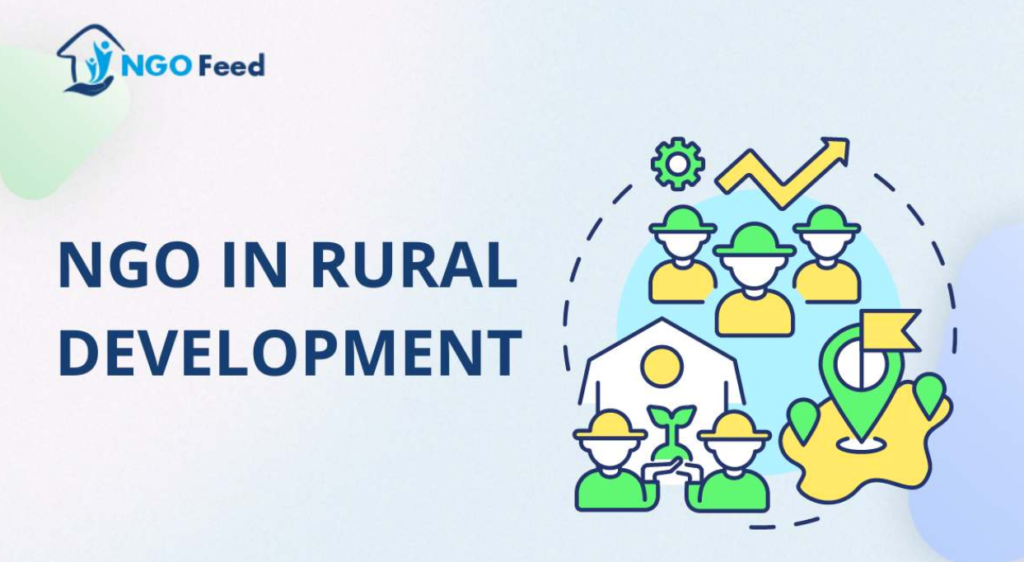
- Bridging Gaps: NGOs play an essential role as intermediaries between government policies and the community’s needs. They identify issues in rural areas and lobby for specific solutions. By working closely with the local population, NGOs ensure that resources are appropriately allocated to where they are needed most.
- Empowerment and Capacity Building: Some core functions of NGOs include the participation of communities in making decisions. Participative approaches to management can lead to more ownership and responsibility among the individuals in the communities who spearhead the developments. Empowering communities leads them to effectively confront their challenges as well as take a sustainable development path.
- Providing Basic Needs: NGOs usually focus on the provision of essential services like education, health, and sanitation. In doing so, they lay the basis for the general development and well-being of the community.
Read more: ngo in pune for donating clothes
Major NGO in Pune working for Rural Development
BAIF Development Research Foundation
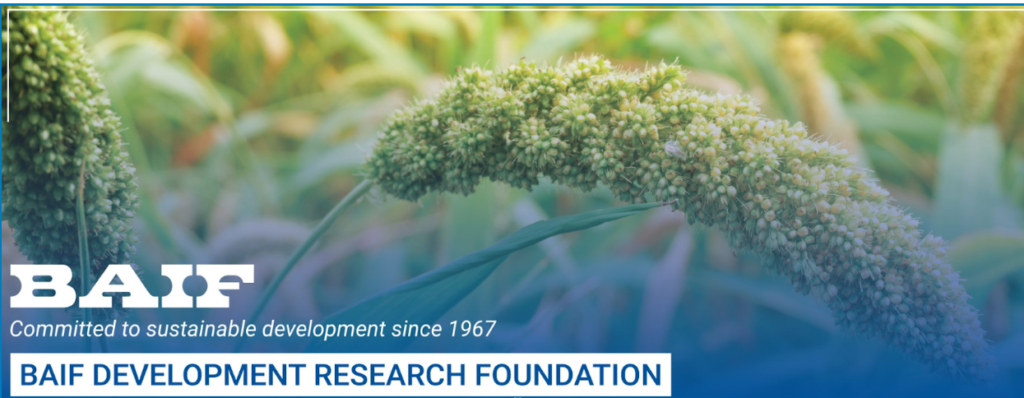
Overview: Founded in 1967, BAIF Development Research Foundation is one of the top NGOs in India that focuses its work on rural development. Their objective is the betterment of the quality of life for rural society through sustainable livelihoods.
Key Initiatives:
- Agricultural Development: BAIF facilitates sustainable farming systems and trains the farmers on high-technology agriculture methods. They practice organic farming along with crop diversification to increase production.
- Animal Husbandry: BAIF promotes dairy development programs to upgrade the incomes of rural families, mainly by educating them in better animal husbandry and management practices.
- Women Empowerment: In its approach through self-help groups (SHGs), BAIF empowers women with literacy regarding finances and entrepreneurship and offers them easy access to microcredit to enhance entrepreneurial capacity among women.
Impact: BAIF has greatly uplifted the living standards of thousands of families by incorporating agriculture, animal husbandry, and women’s empowerment in its activities. The outcomes have resulted in the enhancement of the income level of rural families and better food security.
Website: https://baif.org.in/
Goonj
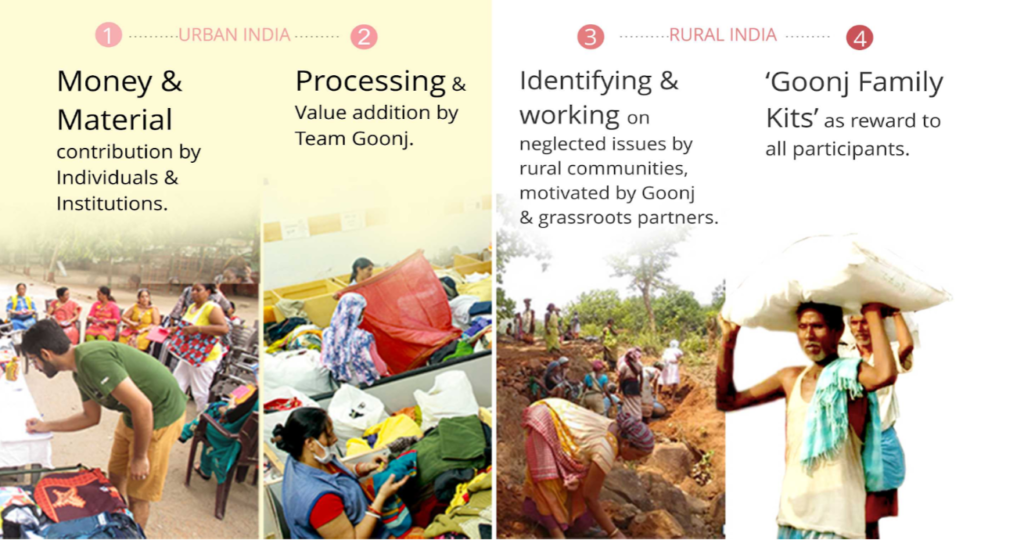
Overview: Goonj is an innovative NGO founded in 1999. This organization transforms urban waste into resources for rural development. Their approach links urban surplus with rural needs.
Key Initiatives:
- Redistribution of Resources: The NGO Goonj gathers surplus in the cities, such as clothes and household items, and redistributes them to villages where there is less availability.
- Livelihood Programs: The organization helps the villagers by conducting skill development workshops to create sustainable livelihood options.
- Sanitation and Education: Goonj emphasizes sanitation projects and educational initiatives to uplift the living conditions of rural areas.
Impact: By utilizing urban resources, Goonj has effectively met the fundamental needs of rural people while instilling self-sufficiency. Their innovative approach has motivated others to look at waste as a resource rather than a liability.
Website: https://goonj.org/collection_camp/pune-43/
Center for Agriculture & Rural Development (CARD)

Overview: CARD, or Center for Agriculture & Rural Development, established in 2008, has a focus on natural resource management and human resource development in the Jalna district of Maharashtra.
Key Initiatives:
- Farmer Support Programs: The program links marginalized farmers with governmental initiatives such as seeds, financing support, and skill-building interventions regarding sustainable agricultural systems.
- Capacity Building: The organization organizes training sessions to enhance irrigation management and pest control among local farmers.
- Women and Youths Empowerment: CARD promotes education scholarships to the youth and helps with women’s self-help groups, with the aim of fostering entrepreneurship among women.
Impact: CARD has positively impacted the lives of more than 5,000 marginal farmers by enabling them to get access to government schemes. This has enhanced agricultural productivity and ensured food security.
Read more: christian ngos in pune
SARDA (Social Action for Rural Development)

Overview: SARDA is a multi-regional nongovernmental organization created in 2001., with a broad reach of activities related to natural resources management within communities and tribals.
Key Initiatives:
- Natural Resources Management (NRM): This organization initiates projects to improve land and water resources by practicing sustainable resource use.
- Tribal Empowerment: SARDA works toward providing tribal communities with access to rights and entitlements through awareness.
- Sustainable Livelihoods: SARDA has introduced organic farming methods and adaptation strategies for climate change among the tribals.
Impact: SARDA has extended irrigation facilities on thousands of acres of land and has increased the productivity of agricultural land among local farmers. Their work has empowered tribal communities by enhancing their access to resources.
Website: https://www.rcrc.in/partners/sarda/
Vanasthali Rural Development Centre
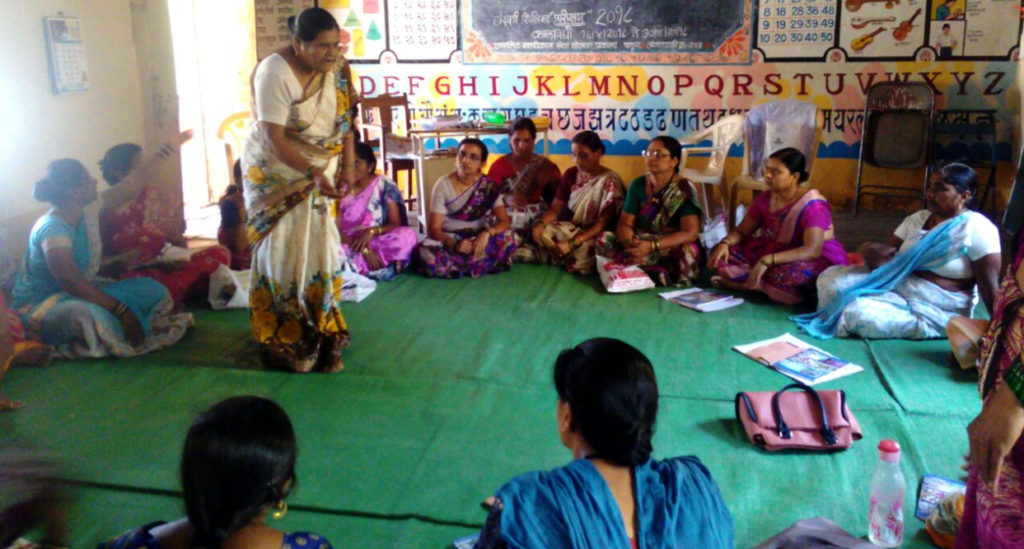
Overview: Based in Pune, Vanasthali focuses on child welfare, education, women’s issues, and overall rural development.
Key Initiatives:
- Education Initiatives: The organization runs schools and educational initiatives that aim to increase the literacy rate of children in rural areas.
- Empowering Women’s Efforts: Vanasthali empowers women through vocational skill development programs.
- Health Projects for Rural Villages: They also strive to upgrade health centers by organizing health camps and taking part in sanitation drives.
Impact: Vanasthali has successfully improved the delivery of education and empowered women in rural areas. Their method touches upon various aspects of rural life, thus becoming a great agent for community development.
Website: https://www.vanasthali.com/
Pratham
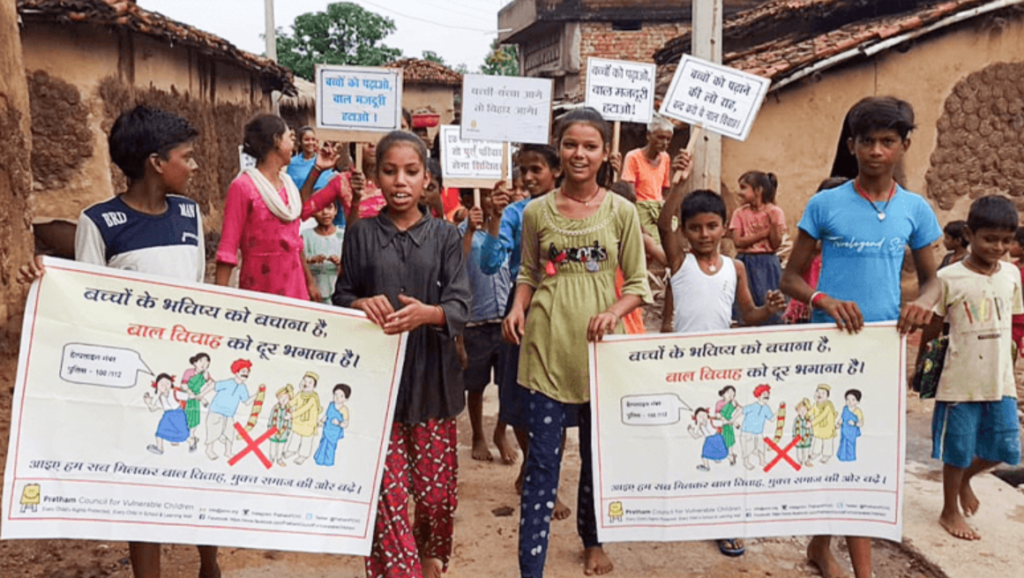
Overview: Pratham is one of the largest nongovernmental organizations in India dedicated to education. Though headquartered across the nation, it maintains some of the most extensive programs focused on rural education in Pune.
Key Initiatives:
- Learning programs for children: The organization hosts learning camps and afterschool sessions to help raise literacy levels for those who are either out of school or underachieving students.
- Vocational Training for Youths: The organization has skill development programs that are focused on the local industry’s needs and help the youth get employment.
- Community Engagement Initiatives: Pratham works with parents and community leaders to spread awareness about education through workshops and seminars.
Impact: Pratham has been successful in improving educational access and quality for thousands of children in rural Pune. Its innovative teaching methods have been adopted widely across several states because they work.
Website: https://prathampune.org/
Swayam Shikshan Prayog (SSP)

Overview: SSP is an organization formed in 1998 focused on women’s empowerment through self-help groups and sustainable livelihoods in rural settings.
Key Initiatives:
- Self-Help Groups: SSP supports women in establishing SHGs with a focus on savings, financial education, and enterprise.
- Health and Nutrition Programs: The organization delivers health education activities focusing on maternal health, nutrition of children, and hygiene habits.
- Disaster Resilience Training: SSP trains communities on disaster preparedness and resilience building against natural calamities
Impact: Thousands of women were empowered through SHG, and as a result of this, the independence of finances from SSP. These have strengthened communities’ ability to withstand disasters while improving health benefits and economic well-being within these communities.
Website: https://swayamshikshanprayog.org/
Key Focus Areas for NGOs in Pune
- Agricultural Support: NGOs greatly improve agricultural productivity by advocating sustainable farming techniques like organic farming, crop diversification, and water management strategies. They deliver training sessions, resources, and market linkages to enhance the income of farmers.
- Health Improvement: NGOs establish mobile clinics and telemedicine services in places where healthcare infrastructure is not established. They work on sanitation projects as well to ensure hygiene awareness among rural populations.
- Educational Initiatives: The NGOs are quite active in overcoming illiteracy since they set up community schools and adult education initiatives, which empower a person with skills and knowledge essential for economic progression.
- Women Empowerment: Many NGOs focus on women’s empowerment through skill training, microfinance opportunities, and self-help groups. These programs aim to improve women’s financial independence and social awareness.
Read more: food donation ngo in pune
Challenges Faced by NGOs
Despite their significant contributions, NGOs working in rural development face several challenges:
- Funding Constraints: Most NGOs rely on contributions and grants from private individuals or corporate donors. This constrains the scale of their programs or could limit their ability to reach a more significant number of beneficiaries.
- Infrastructure Limitations: The basic infrastructural facilities provided by the roads, electricity, clean water supply, and communication facilities are scarce in most rural areas. Outreach programs by NGOs may be less effective, or beneficiaries have access to hard-to-reach services.
- Policy Barriers: It’s sometimes difficult to negotiate bureaucratic process requirements for NGO project implementation and accessing government services. Advocating for policy change can be timely but is essential for the sake of rural areas.
- Community Engagement: There are times when people in specific communities will never believe in anything other than that an external entity will not come and help due to past frustrations or cultural disparities. Good communication can help defeat this obstacle.
Read more: government ngo in pune
Pune Rural Development NGOs Success Stories
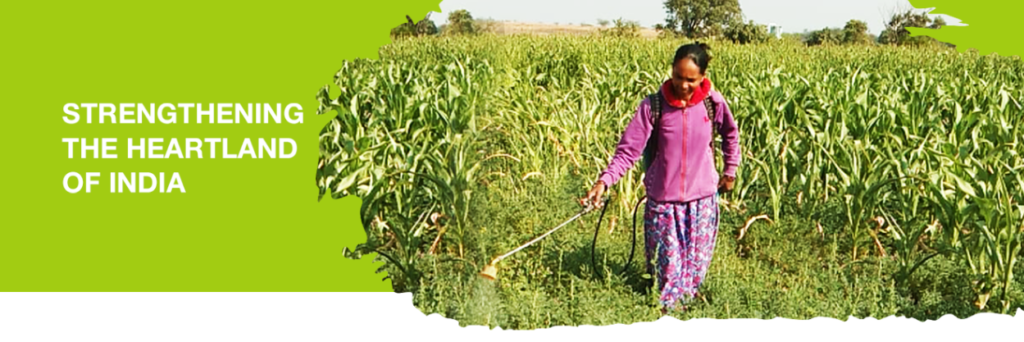
Several success stories could be used to illustrate the impact of these NGOs:
Case Study 1: BAIF’s Dairy Development Program
It worked out a dairy development program in the village near Pune, providing them with training in modern dairy farming techniques and capital support through SHGs. Most families were able to double their income within two years because of milk production increases and greater access to the market.
Case Study 2: goonj’s “Not Just a Piece of Cloth” Campaign
Goonj’s campaign was about giving away surplus urban clothing during floods or droughts and providing sanitary products for women in the long term. This not only helped in immediate relief but also started a discussion about hygiene practices within communities, leading to better health awareness.
Case Study 3: CARD’s Farmer Training Program
CARD’s farmer training program helped participants from marginalized backgrounds who had previously failed to grow crops due to a lack of knowledge on sustainable practices learn effective methods, which resulted in yields increasing by more than 40%. This success led them to form cooperatives, ensuring fair pricing when selling produce, thus enhancing economic stability.
Case Study 4: SSP’s Women Empowerment Initiative
SSP’s initiative helped form SHGs, where women learned skills ranging from tailoring handicrafts to marketing products locally and generating income stream families. Many members reported newfound confidence in participating in community decision-making processes advocating rights to families.
The NGOs listed above are but a few of the many that work relentlessly to develop the rural areas of Pune. The initiatives they take on are very diversified and aim to address key issues such as poverty alleviation, education improvement, healthcare access, women’s empowerment, and sustainable agricultural practices.
These organizations continue working with local communities, government bodies, and private sector stakeholders, playing an essential role in promoting inclusive growth and sustainable development.
The impact of these NGOs in Pune is profound; they not only uplift individual lives but contribute significantly to overall progress in rural areas of Pune.
By supporting such organizations with donations or volunteering work, individuals can help build resilient, prosperous rural communities across India.
With continued commitment and collaboration between all stakeholders involved, we can see a brighter future for our nation where every citizen enjoys the benefits of social and economic progress.
Leave a Reply